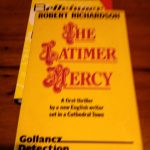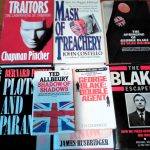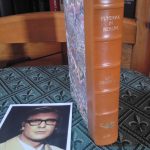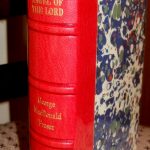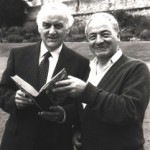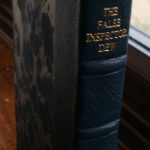George Blake (1922 – 2020) was one of the most enigmatic of the unmasked spies. Could he have been an unlikely perfect spy with a conscience; a man of principle or a blatant schemer? Accounts of Blake’s deeds vary a great deal: what he did or did not do and why? What the world knew of Blake was through the media circus surrounding through the fiasco of his Old Bailey trial and 42 year prison sentence; and most famous of all – the escape from Wormwood Scrubs to spend over fifty years in Russia. Accounts written by ex-service personal tell the story of Blake the traitor – the man who undermined British “influence” particularly in Eastern Europe, and gave the names of not dozens but hundreds of spies to the enemy. More sympathetic, historical analyses have demonstrated a quite different person.
As a young man George Blake led a life full of courage and dedication, yet he had a complicated background. Brought up as George Behar in Holland, his father Albert was born in Constantinople, studied at the Sorbonne and joined the French Foreign Legion and later transferred to the British Army, fighting in Mesopotamia. He concealed his Jewish background from his wife’s family because of anti-Semitism. He was married in London and christened the son after the King of England! He died in 1934 and wished for George to be looked after by his wealthy sister in Cairo. In Egypt young George came under the wing of his left-wing cousin Henri, but in his autobiography he made it clear that he rejected political activity because of his austere Calvinist upbringing, but also that the political discussions later had “acted as time-bomb, and the results under the affect of events shaped my further views”.
In 1938 George was back in Holland as a school boarder where he experienced first hand the bombing of Rotterdam. When the Nazis attacked the Gestapo arrested him but he had the resolve to escape and join the Dutch resistance. He managed to make his way to England in 1943 and as a British subject awaited the call up that frustratingly never seemed to come quick enough. However, he had the good fortune to meet with a naval commander who was also an intelligence officer known to him from his work with the resistance; the officer recommended he join the Royal Navy but he was medically unsuited to submarine duties. His gift for languages was initially overlooked; but when at last his talent was recognized, and having changed his name to Blake, he was commissioned and worked with the Dutch section, where he trained agents to be dropped into Holland and he decoded intelligence material that came back. While his superior was away he ran the section. In 1944 was promoted again to the staff at Supreme HQ in regard to the Normandy landings, and was a leading member of the Dutch team during Operation Market Garden. All this work involved intelligence and processing it to arrive at an understanding of how the enemy thought. After the war Blake was assigned to be CO of the naval intelligence at Hamburg, which was cover for recruiting agents that crossed over to the East. He both trained operatives and assessed the information that they gathered from the other side.
Because of his outstanding war record he was recommended to join SIS and become a specialist by studying Russian at Cambridge University. The decision to stay on in service to his country was mainly to do with his upbringing. His personality was torn between his the strict religious beliefs set out by his father who wanted him to become a priest and his cousin and relatives who had anti-imperial national liberation beliefs. Apart from his mother he had no family in Britain. Not surprisingly, he craved the craved the discipline and sense of duty that being a service career provided. During his studies of Russian language, history and literature he found a passion Russia – a country that had been beset with set-backs and reverses such as the invasions launched by the West under Napoleon, the Whites and Hitler. It is interesting that while reading political texts in the original language he also attended Russian Orthodox services. He was fully immersed in Russian national perspectives, and later Blake candidly admitted that it was at this juncture that he would at some point assist the Soviet Union.
After completing his studies Blake was posted to Seoul, the capital of Korea. His task was to form a cross-border spy network. Given the geography and logistics this was an unlikely prospect. Perhaps the Foreign Office knew it was a potential hot spot and wanted to test him. It was not long before war broke out he and the others were captured and held in an internment camp. No orders were ever received to evacuate. When the Chinese entered the war Blake, Captain Holt and the other captives were forced to march through hazardous mountains. The so-called “death marches” inevitability took its toll. During this time he again showed outstanding capabilities. All accounts praise Blake for his leadership and inspiration. He negotiated with the Russians and had many prisoners evacuated on humanitarian grounds. His compassion for others was recorded by the survivors, and his bravery and cleverness was shown when he escaped the POW camp; but unfortunately he was recaptured and facing death by a firing squad on a charge of spying he called out in Russian he was not a spy, but had diplomatic immunity! They did not fire.
Back in London Blake was hailed as a hero and nearly made it onto the honors list. He was reluctant to settle, and the potential in-laws prevent a marriage because of his Jewish background. However, it was more or a condition that he found a partner, and he found one at the SIS offices at Queen Anne’s Gate, where he met and later married Gillian Allan. Her father was a serving member of SIS too. However, Blake has since admitted that he agonized over whether it was right to marry someone who he could not share his secret leanings. Several times he wanted to tell her what he really felt, especially at the end of his career, but he could not.
At the beginning of 1955 Blake was posted to Berlin, the largest and most important overseas posting of the SIS. His task was to find and “turn” East German agents. Collectively, the service seems to have in toto confidence in Blake’s character and ability. They may have selected him as the chief Berlin espionage agent who was to find out what the Russians really knew as a double agent. This is born out by former SIS operatives and the espionage writers Cookridge, Deacon, Knightley, Montgomery Hyde, Porter, Rusbridger, and Wright. The theory that SIS selected Blake as a double, making it his duty to give away secrets in a bargain or swap for the other side’s secrets has become orthodoxy over the years. Officially, it is vehemently denied and it has no factual published support. Indeed, if it were true why has no evidence been uncovered in the KGB archives. Historian Andrew and the defector Oleg Gordievsky (who write together) researched the archives and were unable to find anything that supports the British double theory. Perhaps he had a KGB code name that could not be traced. Blake himself denied he was a double double. He had decided to work for Moscow in 1951 and became active in 1953.
One of Blake’s first large-scale secrets passed to Moscow Centre was details the joint GB/US project Operation Gold. He was committee secretary and therefore well placed to know the details. Gold was an attempt to garner secrets by listening to the Russians on the other side from devices placed in an underground tunnel (somewhat reminiscent of tunneling during the First World War). When the Russians “discovered” the tunnel in 1956 SIS/MI6 held an inquiry into the leak. No culprit was found. With hindsight it seems that Gold was probably a diversion instigated by Blake meant to keep the Allies busy with false information. Blake had told the Soviets about the plans even before it was built. Yet Blake remained undiscovered despite it being rather obvious that someone had told the enemy. It would seem that the joint Allied sponsors wanted to believe it was successful because they had an enormous amount of Intel to access and quantify. Apparently, they never discovered the counter-intelligence plot until Blake confessed! It was particularly galling for the policymakers, shattered the ambitions of technical ops and was a heavy financial burden for the American government, not to mention Anglo-American intelligence co-operation.
Between 1955 and 1959 numerous agents were “swapped” or “apprehended”; what is unclear is what exactly is George Blakes’s responsibility is in this web of deceit and double bluff. In 1959 knowing that he was in danger he returned to England, and was then sent out of bounds to the spy school at Beirut. Toward the end of the following year Blake was called back to London for an “interview”. A high-ranking Polish defector had given evidence of Blake’s betrayal to the Americans. Confirmation of Blake’s involvement in a compiling a list of potential recruits as possible double agents for the KGB came following the arrest of Blake’s deputy Horst Eitner in September 1960. This time the top echelons could not over look it. Blake had been warned by Kim Philby not to return to Britain as he was certainly would have been arrested for treason. Blake was very troubled as to how to respond. He decided he was see it through and was arrested by Special Branch after a brief meeting with his chief, Sir Dick White.
Accounts of what happened next are often carefully edited to gloss over the pertinent points of motive and what a predicament the Foreign Office was in. Costello gives an edited account, but Blake himself and those that actually knew him confirm that the process of inquisition took place at a country house, where he was questioned for several days. This was confirmed by CIA leaks over the years. During the interviews over four days he does not held in custody and was allowed to stay with his mother in Radlett, Hertfordshire each evening. He was calm and the questions were politely put. He admitted to no offenses. One of the complications was as a senior intelligence officer he had latitude to exchange information, including the names of low ranking contacts. Only by taking a long view could it be proposed that secrets had needlessly or wrongly been passed. Few people would have had the whole picture. So, in the end it was all about doubt and trust. Then when the process was over, and they could not reasonably find any offenses backed by tangible evidence, he was told that they knew he had spied for the Russians and painted a scenario along the lines that he was tortured and made to confess in Korea; therefore after they “blackmailed” him to aid the Soviets. Blake dismissed this and scornfully admitted that had worked for the betterment of mankind by helping the Russians.
His inquisitors must have had a great deal of difficulty in understanding what Blake’s motivation was. For he believed that Britain and the United States had become morally corrupt at the political centre; he helped the Russians to redress the balance in world affairs. Historians differ when the Cold War started, for Blake it was Churchill’s bellicose Fulton speech in 1947, a few years’ later he witnessed the bombing of North Korea, something on an unimaginable scale; this had made him consider that the United States, under the guise of the United Nations, was destroying any prospect of peace. One can speculate on what else he said, he would no doubt have rallied against the use of MI6, along side the CIA, in covert military interventions in the Gulf, and the garrisoning of British troops to protect wealthy autocratic rulers. Middle Eastern regimes that were not compliant to Allied policy were to be removed by fair means or foul. Although a Jew, like his cousin Henri, Blake empathized with the Arabs, and could well have privately been in less accord with Soviet machinations in the region. He would have known too, that the body politic in Britain was itself divided. The liberal wing of the Foreign Office favoured recognition of the Arab cause, the PLO; this position was opposed by the hawks in SIS who promoted military adventures with little understanding of the Arab world.
The next day he was taken to a Hampshire country house for a conference lasting several days, while his superiors considered what to do. Such a scene of introspection, moralising and the weighing of political and moral dilemmas, all has echoes in the work of modern espionage writers. Blake himself was under the impression that the option of quietly disposing of him was considered. We only have Blake’s word for this. But why was he taken to the country house for further talks and strolls around the grounds, with Special Branch in tow, if the authorities had already made up their minds? It was all very messy, whichever way it was handled. The choices were three-fold: they could quietly dispose of the top agent, transfer him or have a trial. If MI6 opted for the latter they had to be sure Blake would not withdraw his confession. They had to get into the moral centre of the guilty party to know, as a matter of honour, he would not withdraw his confession at the last moment. This is why another SIS officer, whom Blake had known, actually shared the same bedroom. The second choice was to sideline Blake to somewhere where his talents would benefit Britain at least as much as the Soviet Union. It could be justifiably argued, that in learning Arabic for further service in the Gulf he was already going to fulfill this role. The problem with this, as already referred too, was that British policy was at best ambiguous, and Blake was himself responsible for too much embarrassing damage. So, if not the Middle East, perhaps somewhere such as Hong Kong station? The Sino-Soviet dispute was surfacing at this time. The second option must have been weighed carefully, because as Graham Greene said, “A spy allowed to continue his work without interference is far less dangerous than the spy that is caught. How right SIS was to defend Philby and how wrong MI5 was to force him out into the open. The West suffered more from his flight than from his espionage”.
The investigative work of Michael Randle and Peter Pottle provides solid evidence based on legal procedure that the charging of the defendant and his first committal hearing was held not before either Monday 10th or Tuesday 11th April, some seven or eight days after the 4th April when he was first interviewed by the secret service. This is based on reports in the Times that Blake was remanded on the 18th April and the 24th April for the third time; and also legal procedure that custody remands cannot be for more than eight days, and are usually less. Other circumstantial evidence of the date of Blake’s formal arrest was that his wife Gillian was not informed of this action until 12th April. George Blake was held on remand at Brixton prison for a month before his trial at the Old Bailey on 3rd May 1961. Randle & Pottle point out that in many respects the trial was illegal. It was a secret trial, held in camera, with no provable evidence; it involved a gross misapplying of the law against parliamentary statute regarding the sentence, and the appeal was undermined by a smear campaign. In their view, it was devoid of justice and that was why they were determined to assist in Blake’s escape.
Since George Blake had signed a confession and he knew that he would receive a prison sentence what is the problem? According to Blake, he friends in SIS were friendly and supportive until an important telephone call was received on the evening before he was handed over to Scotland Yard. Then the mood changed. Blake had been given to understand that one charge and only one charge was to be put under the Official Secrets Act. He denies that any plea-bargaining was ever discussed. One may or may not conclude from this point that his statement was full and frank – so much so that highly secret matters were divulged – and possibly, if Blake were a triple, names of talent spotters and protectors within the intelligence services. One name he might have given was Kim Philby, since one source names him as his talent spotter. This would have been around the time Philby was working with the Dutch section of SOE and before Blake became a full-time SIS intelligence officer. Instead of one charge, with a maximum penalty of fourteen years’ imprisonment, Blake was faced with five charges – all for the same crime – and the only evidence of guilt was his confession. For this, he received five maximum sentences of fourteen years, three running consecutively, and two concurrent, making a total of forty-two years’ imprisonment.
The authorities went to extensive lengths to suppress the true nature of the trial. However, it was reported more fully overseas, and this led to informed opinion in Britain taking note; parliamentary questions followed. Despite the fictional adventures of Ashenden and James Bond, no government had ever acknowledged the existence of the Secret Intelligence Service (until fairly recently). To do so, it was feared might inadvertently disclose too much about what it was for and how it was deployed. The Prime Minister, Mr Macmillan, although at pains to avoid mentioning the service, when asked directly was he an employee of the Foreign Office he did not deny it. He also made remarks that were malicious and prejudicial to Blake’s appeal. However, this was not all. To allay further criticism, a meeting of cross-party Privy Councillors was held in private, but one of the members present Mr George Brown met with Chapman Pincher on the very day the appeal got under way. Pincher has confirmed that the intention was clearly that an ‘inside story’ on Blake had been made available to the press. The next day, Fleet Street sizzled with the emblazoned headline: ’40 Agents Betrayed – all by this man’, coupled beside Blake’s photograph. The defendant’s council, Mr Hutchinson QC has confirmed that this claim was not in the deposition. It was a wicked smear and is tantamount to a deliberate subversion of the judicial system by use of a backhand leak concerning Blake’s sabotaging of this countries’ information gathering capability. This action effectively terminated the appeal.
In my opinion, the kernel of the Blake scandal was the political trial, which was really about revenge for the political sleight of Macmillan being outmaneuvered – not once, but several times by Blake’s actions. As Prime Minister, Macmillan and his Foreign Secretary Selwyn Lloyd, were kept waiting in Moscow for a week while General Secretary Khrushchev reportedly had “tooth-ache”. However, this comic episode concealed a split over nuclear diplomacy, which the Russians exploited. In Ted Allbeury’s Shadow of Shadows, Blake reported on the split to Moscow. In the late 50s and early 60s, Macmillan pursued an aggressive policy in the Middle East; as well as Egypt, Britain intervened in Iraq twice and in Oman. It is quite possible that when Macmillan heard that Blake had been responsible for the rolling up of SIS’s ambitious Egyptian network he was riled. Several sources also state that Blake divulged secret information about SIS’s two assassination attempts on Nasser – one before Suez – the other a blatant revenge attempt after. Perhaps without Blake’s intervention the Suez debacle might have been averted. All this made the Prime Minister demand his public humiliation. This point is further explained by the fact that as Eden’s chief adviser on foreign affairs, Macmillan pressed for military action against Nasser, even without any assurance of American support. However, when the mission produced a financial crisis, he quickly climbed down and called for an immediate cease-fire. Harold Wilson was quick to drolly quip that he was “first in, first out” of Suez. Thus, the Prime Minister was doubly vexed by Blake’s interference.
Blake spent nearly five years in Wormwood Scrubs prison, London. Several times he was due to be moved to one of the newly built high-security prison such as the Isle of Wight. This never happened. Why? He was content where he was. He was treated fairly, could learn Russian and dream of his new life in Russia. Through contacts in the prison he was aware that an escape was pending. The written records by Sean Bourke, The Springing of George Blake and The Blake Escape by Randle and Pottle are lengthy first hand accounts of the escape. The generally accepted view is that these amateurs set up and executed various aspects of the escape. Perhaps, but it is likely the big players had a role too. We know that Blake talked to KGB agents in prison. More significant is the MI5 role, perhaps, in the drama. Some sources suggest that Five kept a discrete watch on Blake when he was based in London. They may have reported all long to the wing of Six which had reservations about covert ops. As we previously pointed out the liberal wing of the Foreign Office was opposed to the Nasser assassination attempts, and Blake may well have been a channel to help to abort the plots. In short they owed him.
George Blake was taken to Moscow where he lived as an honored citizen for the rest of his life. His marriage to Gillian was dissolved while he was in prison and he remarried in Russia. He sacrificed friendship, honor and love for his cause – a cause that was basically, internationalist, peace seeking and anti-imperialist. But like all idealistic beliefs, the real world is not this perfect place, and messy compromises sometimes have to be made. George Blake’s views on Britain as a world power and society were shaped by his experiences during the war and its aftermath. He would have known from his friend and double agent Kim Philby that Britain was since 1940 bankrupt and financially dependent on the United States; and since the Americans had driven a hard bargain, Britain would henceforth assume the role not only of junior partner, but had lost its global power status. Early in his career he had seen the abject failure of leadership in the led up to war, then the capitulation at Dunkirk and the fiasco of Market Garden – where crucial decisions were taken in the basis that British generals’ judgement were ‘superior’ – they erroneously believed and the enemy would crumble even though the overwhelming evidence showed otherwise. All showed Blake that Britain was still run at the centre as a semi feudal system of masters and servants. He was an outsider and never really integrated into British society. When he returned from Korea he felt he had no choice but to work for the Russians. For in Britain he had felt uneasy, encountering prejudice and discrimination. He realized, one can speculate, that an unreformed Britain would continue to decline. Like George Orwell (in Lions and Unicorns) he favored a more rational, egalitarian and inclusive society: a country where planning and state intervention was effective and fruitfully combined with liberty. As it turned out his hopes of a more democratic state in the Soviet Union never became reality. Blake died at the end of 2020 at a time when Britain was shown wanting – wanting once again in not having the leadership necessary to exercise good judgement and decision-making during a perilous time of crisis. Britain was late to digest the worldwide threat and it could be argued more British citizens perished because of the pandemic, as a consequence of its largely unreformed administration of government reliant on private enterprise and the old ethos of almost unchanging upper class values.
As for the “British agents” Blake is reputed to have put in danger the majority were not actually British, but mainly Eastern Europeans; man and woman that knew the risks, and were in some senses, themselves traitors to there county.
* * * * *
Fictional Espionage writers and Blake
After Blake’s trial and imprisonment he was visited by at least one writer who later become a famous spy novelist. It is interesting to compare the service records of writers that had similar backgrounds and then plot devises they often used that bear some resemblance to Blake’s career. The first writer that comes to mind is Ted Allbeury. His own career in intelligence is legendary. In the Second World War he was a Special Operations Officer assigned to overseas missions such as parachuting into Nazi Germany to find Germans that the Allies could negotiate with. After the war he was a Nazi hunter using intelligence, and then of course, he ran one of the first espionage rings in East Germany. He was double-crossed, captured and tortured. Many years later his daughter was kidnapped. Allbeury’s books show places such as Berlin or Moscow and have a genuine feel for emotions and motivations of espionage agents. His novels are not concerned with action so much as with the human cost of the spying game. Allbeury wrote about real spies such as Blake and Philby. He knew them in real life. One should also mention Ted’s friend and compatriot novelist, Len Deighton. Deighton’s espionage thrillers are about the morality spying. They are carefully crafted to give his readers satisfaction on many levels. They usually are about moral choice and the characters on both sides are conveyed with depth.


